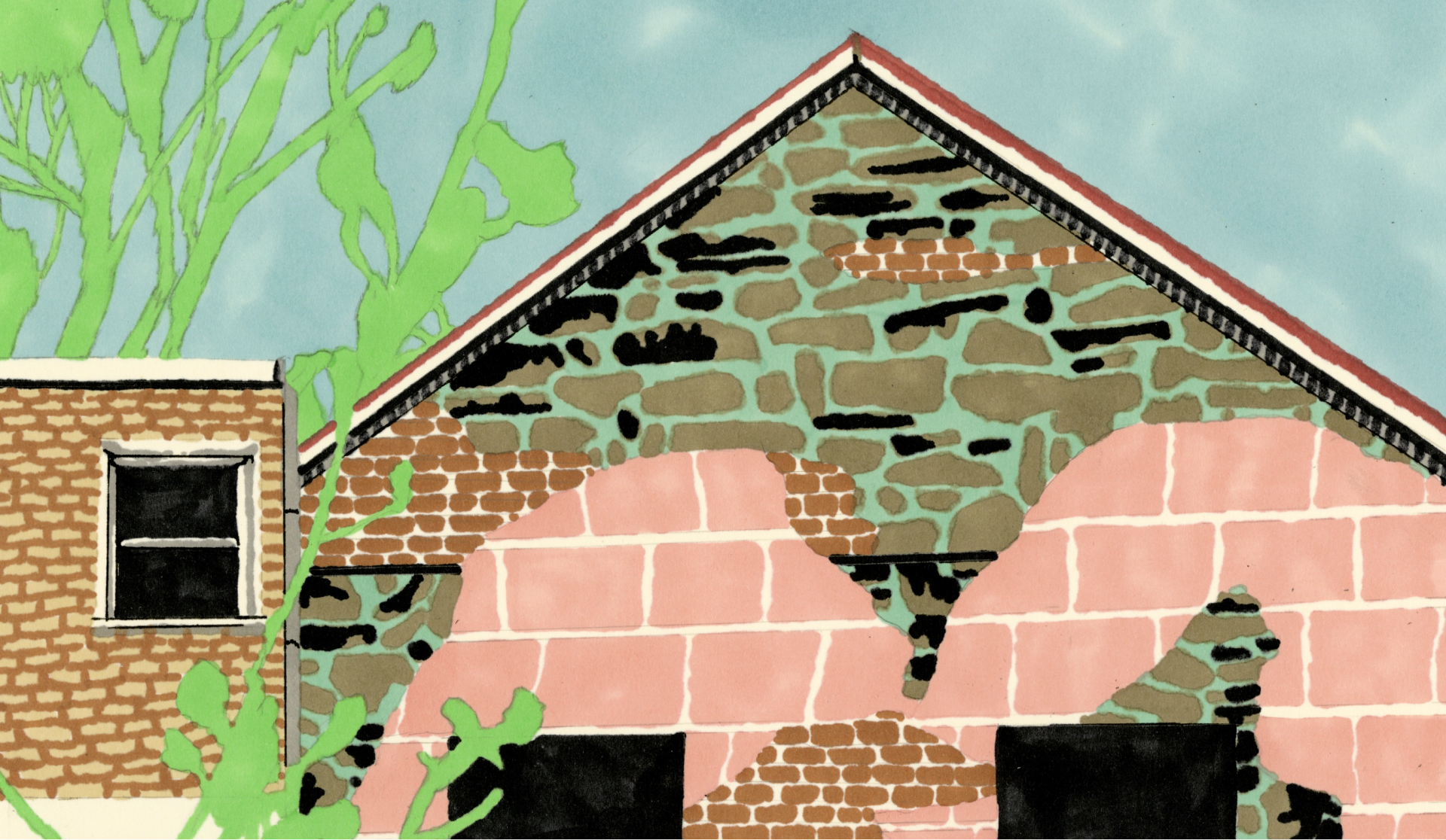
Illustrator: Marie Jacotey
Homesexual is a column devoted to interiors and interiorities. For the first installment, Emanuele Coccia considers what homes are, and what our experience of moving says about how we love.
For centuries, it was the black hole of reflection: the place where brains fled to stop having ideas, to close the eyes, to take a break from the world. To disappear. Philosophy has multiplied its objects, diverged its genealogies and geographies, diversified its ways of speaking and being in the world, and yet it remains terribly snobbish about the house. It does not even seem to tolerate it as the subject of a quick online post. There is nothing casual about this neglect. The effort to think the city and to present oneself as an active force within the city—in the streets, in theaters, in parliaments, in shops—is at the heart of the modern project: to get out of the house, out of the genealogy, out of the identity of origin to produce a new common freedom. The city was this enormous machine of liberation from domestic space: the device that allows things to happen, power to manifest itself but also to be won and distributed equally, new freedoms to be expressed and acquired.
And what of the home? To understand our time, it is urgent to observe, describe, and continue to imagine our homes differently. And, above all, to understand why we really need them. For centuries, houses were immense filters of reality: the world entered partially or distorted, in the form of a moving image. History had to happen outside. Inside these walls, it was better that nothing happened.
In fact, architecture has also neglected the home. From Aldo Rossi to Rem Koolhaas, from Robert Venturi and Denise Scott Brown to Kevin Lynch, architects have produced sublime books on the city that are now classics of the twentieth century. I challenge you to find something similar for the domestic space.
There is nothing innocent about this neglect: it is in the home that gender inequality has been normalized, and it is through the structure of the domestic space that what we call patriarchy exists. But the lack of curiosity, which is the first fruit of snobbery, comes at an even higher price: it is within the walls of the home that the most radical and important moral revolutions of recent decades have taken place, and to know nothing about the home is to be excluded from it. Within the domestic walls, a new gender balance has been distilled, new forms of love and cohabitation have been invented.
For centuries, love was supposed to ensure access to wealth for half of the population. Women were not paid for their labor or entitled to free access to property, even while their work made possible the very reproduction of humanity. The decline of this structure, which especially began when LGBT culture started to publicly engage with the idea of marriage, and revolutionized the idea of the relationship. Sharing time, space, money, and even a name with another individual did not have to be for the purpose of begetting children and passing on money to them. If one eliminates the idea that the center of the family is reproduction, it becomes possible to start thinking that marriage no longer be limited to two individuals: this is how polyamory was born, and how the need to specify any difference between sexual love and friendship begins to erode.
A love experience not tied to genealogy also changes the idea and structure of kinship. This could extend to shared plans for happiness that goes beyond who your father (or mother) is, and might represent the joint overcoming of patriarchy and matriarchy through a kind of legal translation (albeit in a completely different sense) of philosopher Donna Haraway's famous adage: "make kin not babies." But, in a much more radical way, it would mean making the happiness of our nearest and dearest (our relatives) the space we most attend to.
Within the domestic call, a digital revolution has taken place, and wealth-producing practices have emerged that no longer force us to close the front door behind us. It is as if these forgotten spaces are the cocoon in which the future’s forms of happiness—individual and collective—are being woven and invented. To understand the home today, the experience of moving may be more useful than the knowledge of an architect.
To move is to make a strange, universal judgment about what surrounds us: we choose the things and the people, the animals and the plants, the colors, the memories, the atmospheres that must follow us elsewhere, that must greet us every night on our way from work to sleep, and every morning when we open our eyes. The saved and the lost: a personal paradise. Home, then, is this strange exercise that translates the feeling of well-being and happiness (individual and collective) into the matter of things and objects into the form of this world. It is the place where morality ceases to be a theory of feelings and becomes an infrastructure, a cosmic force, an economy.
That is why we have to recover and reinvent the knowledge of home because if we have destroyed the world, it is also because we no longer know how to make it a home. By privileging politics, the science of the city, we have lost the knowledge of how to be happy.
Moving teaches this: it is objects and people, not walls and roofs, that make a home. Have you ever tried to spend a few minutes in a house without objects or other people? In a house without anything, it is impossible to sleep, impossible to cook and eat, impossible to write or read. I learned one thing in the days I spent, after one of my 30 moves, into a place with nothing but the clothe s I was wearing and a few books: space as such is uninhabitable and hostile. The things allow us to be in space, rather than the space accommodating our lives and the things we need. Home is always a portion of the world, a finite number of its inhabitants, not a geometric abstraction.
Objects make the world accessible: the things of the home are also the privileged tools for establishing relationships with others. And the home has always become a cocoon of new relationships, rather than a place to store and isolate realities.
From the evolution of the quintessential domestic object, the telephone, comes WhatsApp, which has made it possible to revive the experience of living together. When I was a student, anyone could knock on my door and talk to me for hours about anything, and I could allow myself to do the same. It is as if, thanks to social media, we are roommates with as many people as we wish to speak with, who often live on the other side of the ocean and have nothing to do with us. The smartphone has changed the very idea of family: we no longer live only between partners or with children. As a famous American TV series prophesied, the home is now first and foremost a space of exchange and conversation between friends.
This is not just an expansion of the home: it is the most radical change since the beginning of modernity because it removes the opposition between the public and the private. It is as if, thanks to the mobile phone, our living rooms have incorporated the town squares of the twentieth century. Of course, since the advent of television, the home has ceased to be a fortress of the private. But in this case, it is not a simple penetration of the city within the domestic walls: it is now the home itself that becomes the form and matter of public space. More than space, thanks to these new tiny moving homes that are our smartphones, we inhabit images. It is as if the world itself has now become a vast expanse of images, drawn and unraveled at an unheard of speed: and the boundaries of houses and territories are to be drawn there, no longer on the ground of sand and clay. The home loses its territoriality; home and planet coincide.
A house the size of a planet is dizzying and not easy to live in. And long condo meetings won’t solve problems. By being at home everywhere, suddenly every living being on Earth has the status of a roommate. I’ll put it another way. The Anthropocene has often been described as the movement by which we have invaded all space, made the planet our home, expanded our apartments to a point where we directly or indirectly occupy so much of the world and so much of the Earth that there is no space left. But the opposite could also be said to be true: the planet has invaded our homes. We cannot move. There is nowhere else to go. Other species cannot leave their homes either: forests are now the equivalent of our Schreber gardens. We have to redesign the spaces and rooms of this planet-sized house. We have to make it a home for both humans and other forms of life. Again.


